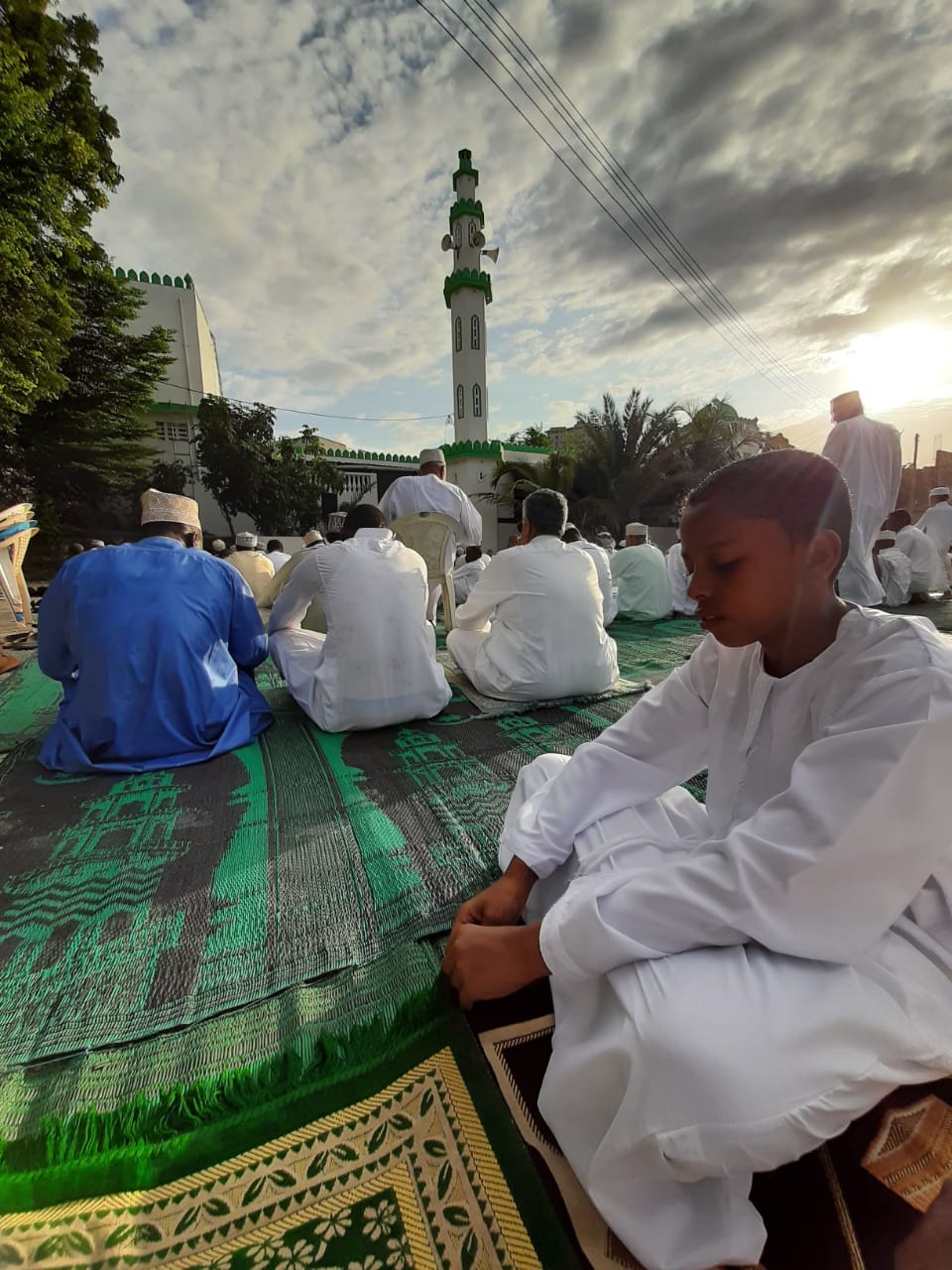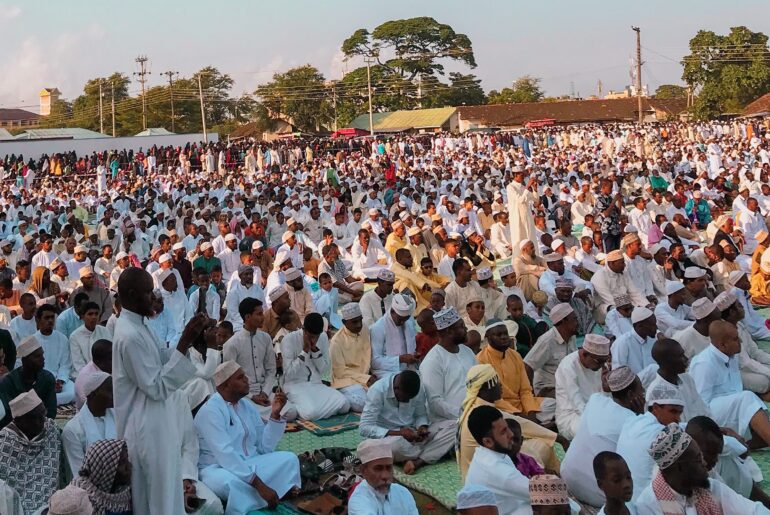Photo Courtesy: Majdermind
Buzz! Buzz! You check your phone for the fiftieth time. You scroll lazily through the messages; Eid Mubarak, Eid Saeed! Each one more similar than the previous. You create a quick broadcast of all close friends, family and colleagues and forward the last message you just received. Okay done, one less thing to worry about. It is almost midnight but the house couldn’t be livelier. The smell of fresh paint, oud and freshly baked cookies choke your throat. Your elder brother is changing the curtains, your mother is still whining about the slightly burnt cake and your teenage brother has made himself the designated taster, picking the well laid snacks one plate after another. The kitchen is a big mess. The sitting room however, is spick and span. If your nosey neighbours were to come as early as 6 a.m. you’d be proud of your little home. We can worry about the kitchen in the morning, everyone suggests. Yet everyone knows that the morning would be more hectic than the last ten days combined.
You try to sleep but your anxious mind wouldn’t let you close your eyes. Did I return the remaining milk in the fridge? Ah, I forgot to send an Eid message to aunty. I should do that first thing in the morning. Now what will we do about the burnt cake? Your eyes finally shut but your mind is still racing with thoughts. Your back is aching from bending over at the traditional ‘mbuzi’, grating several coconuts to prepare mkate wa sinia. You remember your pretty, flowery dress and smile, satisfied. It doesn’t even last you a minute, your mother knocks at your door. ‘Minal aidin!’ she wakes you up. You have barely slept and you have too many reasons to whine about. But it is Eid isn’t it? It is a big day and plus, there’s no time to ask for more time to sleep. So you jump out of bed and kiss your mother, ‘Minal faizeen’.
The entire family is awake for the dawn prayer. Your father and brothers go to the mosque while you, your mother and sisters pray at home. Everyone thereafter disperses to a corner; your brother is ironing his kanzu for the Eid prayer about to happen in almost two hours. Your younger sister is laying out her entire attire from head to toe, ready for a shower while your younger brother is still ‘tasting’. Your father is watching the Eid celebrations in Makkah while your mother is setting up the table. You are in between cleaning the kitchen, checking social media, sharing Eid messages and taking bites here and there.
The table is a beautiful sight. All kind of food is laid out from your slightly burnt cake, to cookies, to donuts, to samosas, to home-made chocolate, to mkate wa sinia to meat pies. Coffee and dates wouldn’t miss either. No one has the time to sit and eat yet so everyone is picking a bite in between doing other things. The phones keep ringing; aunties, friends, cousins, all calling to wish your family Eid Mubarak. The kitchen is finally clean and one by one, each dresses up for the special occasion.
Oud fragrance fills the air and soon enough, we’re all taking photos. The entire family heads to the open-ground where the Eid prayer would be performed. There’s a lot of laughter, hugs, kisses and merry everywhere. Little children are running around in cute dresses and kanzus, greeting almost every elder they meet. It is a reunion; old friends, relatives, all neighbours are there. A beautiful moment. A memorable time. The takbiras can be heard all over the area, people chanting and chorusing, ‘Allahu Akbar, Allahu Akbar, La ilaha illa Llahu. Wa Llahu Akbar, Allahu Akbar wa lillahi Lhamd…’ (Allah is the greatest, Allah is the greatest, there is no god but Allah. And Allah is the greatest, Allah is the greatest and to Allah belongs all praise.)

The prayers are done and a multitude of people walk home together; many white and coloured kanzus and bright buibuis. There’s a heavy traffic jam, cars hooting and lots of smiles on the road.
Back home, your mother sets aside plates with food for the neighbours and your younger brother is tasked to make the deliveries. You’re not sure if the food will arrive safely without him ‘tasting’ some more but you’ve given him enough warning to scare his ever-hungry stomach. You can’t wait for the plates to be brought back from the neighbours’ because they never come back empty. You’re eyeing for the very sweet ‘mkate wa mayai’ and kebabs that mama Zeinab makes.
You now all sit down to officially feast and taste the fruits of your labour, literally! Children soon come knocking on the door asking for ‘Eidi mbarak’ and your mother has all these coins and sweets prepared for them. After the heavy, palatable breakfast, you now have the energy to go visit your relatives one after another.
You decide with your siblings on the map to follow, from house to house. Everywhere you go, you are fed once more and the juices are enough to last you the entire week. Your baby sister is given ‘eidi’ with your aunties and uncles and you see her boasting to other cousins the amount she has received yet. It makes you nostalgic. Gone were the days when you’d be the one receiving the money. Ironically, aren’t you the one needing the money more than your baby sister?! You sigh. Before you drown in your financial crisis thoughts, your mother pulls your baby sister aside and whispers, ‘let me keep the money safely for you. If you need anything you’ll tell me.’ You laugh. You know the trick but your naïve sister hasn’t learnt yet. So she gives out the money not knowing she’ll never see it again. You can’t wait to do that to your own kids someday…just for the culture!
Lunch hour, the extended family gathers at the eldest uncle’s house for his famous biryani. The house is full, the stomachs are fuller and the hearts are fullest. The elders sit together at the sitting room conversing endlessly and laughing loudly. The children are running around. The young adults are confused as usual, trying to be everywhere with everyone.
The afternoon sets in and Eid is never complete without the gwaride. Drums and trumpets blowing loudly within the Old town. The team moves from one household to another in their red, blue and black uniforms and ugly masks. Children and adults altogether following the troupe as the kids jump up and down, singing and chorusing along, ‘twataka leo leo!’ When they’ve had enough of the singing and the troupe has gone further way from home, the children come back.

Your baby sister comes and whispers in your mother’s ears while the other children wait at the door anxiously. They want to go ‘bembeani’ at the famous Makadara grounds. As usual, you and your other cousin who’s your age mate are the allocated baby sitters. You are given some money to spend on your baby sister’s games, play and food. Off you set with your group of naughty kids, babysitting them at home is hectic enough let alone in a public, crowded space. However, you and your age mate have plans to have fun too because who said swings have an age limit?! You just have cross your fingers that you don’t lose any of your ‘ducklings’!
Eid Mubaraaaak!
***
Our next writing training is soon! Register or sponsor a student today 🙂






